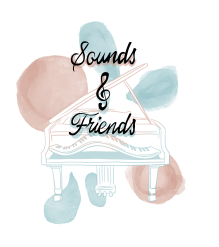It’s time to find a piano teacher.
The piano has been sitting in the corner gathering dust and making you feel guilty every time you pass it.
You don’t know much about music – but you wish you did. So you definitely want to make sure your child understands what they’re learning – not just play a few songs (after all, they could watch YouTube tutorials for that).
Wouldn’t it be great if there was SOMETHING about music learning that you could relate to? Just so you could know that your child is actually learning?
And what about the depth of the learning?
Wouldn’t it be great if your child knew how to go more in depth both in the lesson and at home? What if that became natural, rather than forced?
Is all of that possible?
Actually…yes.
“When taught to understand music, students learn music.”
Dr. Edwin Gordon, music educator and researcher of Music Learning Theory
“When Sofia expressed her desire to study piano, I really wanted her to learn, not just to have fun without progressing. With Arielle, my daughter learns new things in each lesson, and the results are amazing. She has fun, and she practices without being told. Arielle is supportive and caring, and she is doing an excellent job of making the process of learning to play piano fun! It’s great to hear my daughter’s progress, and I strongly appreciate Arielle’s weekly feedback.”
— Elena G., Sofia’s mom
Introducing piano classes at Sounds and Friends:
where students internalise music by moving, singing, and improvising with every new concept
- Weekly classes (of no more than 4 students) – your child will be immersed in a musical environment where they’ll become fluent in music like their native language: by listening, singing, chanting rhythms, improvising, and playing with ease and coordination
- Email support – so you can learn how to help your child and what to look for as they progress.
- Constant creative activities – “Change your song! Play it backwards! Play it somewhere else on the piano! Switch hands! Mix two songs together!” These are all fun, get kids thinking, and deepen their musical understanding.
- Instruction tailored to each child’s level – so every student gets exposure to music at two or three different levels. This allows less experienced students more opportunities to challenge themselves without the fear of failing expectations, and allows more experienced students to solidify their learning by teaching their peers.
- Recordings for home listening – so your child can keep getting more familiar with the music they’ll eventually play.
Piano Starters
Ages 4-6
One 30 minute class per week
2-4 students per class
Piano Partners
Ages 6-9*
One 50-minute class per week
2-3 students per class
*Students who reach a higher level
will be invited to Piano Duo lessons
Piano Duo
Ages 9-14
One 60-minute lesson per week
Overlapping lessons
30 min individual time
+ 30 min partner time
Note: Because I maintain an active performing career as a collaborative pianist,
I only have space for about 20 students.
“Arielle has been so patient and encouraging with our daughter. She has guided Kali through struggling, practicing, and successfully playing. We’ve actually seen and heard her playing improve since beginning lessons with Arielle, and piano has been a great outlet for her!“
— Christie P., Kali’s mom
Choosing a piano teacher is a big decision.
You’re entrusting someone not only with your child,
but also with an education for your child.
So you won’t be charged until after our first meeting.
If you’re excited and ready to go, we’ll get you enrolled!
If it’s not the right fit, you’re under no obligation.
